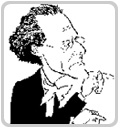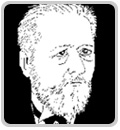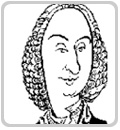|
|
|
|
|
 |
|
 |
|
|
| Naxos Music Library features music by more than 7,000 composers.
|
Bach, Johann Sebastian (1685-1750)
Johann Sebastian Bach belonged to a dynasty
of musicians. In following inevitable family tradition, he excelled
his forebears and contemporaries, although he did not always
receive the respect he deserved in his own life-time. He spent
his earlier career principally as an organist, latterly at the
court of one of the two ruling Grand Dukes of Weimar. In 1717
he moved to Cöthen as Court Kapellmeister to the young
Prince Leopold and in 1723 made his final move to Leipzig, where
he was employed as Cantor at the Choir School of St. Thomas,
with responsibility for music in the five principal city churches.
In Leipzig he also eventually took charge of the University
Collegium musicum and occupied himself with the collection and
publication of many of his earlier compositions. Despite widespread
neglect for almost a century after his death Bach is now regarded
as one of the greatest of all composers.
Bach-Werke-Verzeichnis numbers, abbreviated to BWV, are generally
accepted for convenience of reference.
|
 |
 |
| |
 |
| |
|
|
Beethoven, Ludwig Van (1770-1827)
Born in Bonn in 1770, the eldest son of
a singer in the Kapelle of the Archbishop-Elector of Cologne and
grandson of the Archbishop's Kapellmeister, Beethoven moved in
1792 to Vienna, where he had some lessons from Haydn and others,
quickly establishing himself as a remarkable keyboard-player and
original composer. By 1815 increasing deafness made public performance
impossible and accentuated existing eccentricities of character,
patiently tolerated by a series of rich patrons and his royal
pupil the Archduke Rudolph. Beethoven did much to enlarge the
possibilities of music and widen the horizons of later generations
of composers. To his contemporaries he was sometimes a controversial
figure, making heavy demands on listeners both by the length and
by the complexity of his writing, as he explored new fields of
music.
|
|
 |
| |
 |
| |
|
|
Brahms, Johannes
(1833-1897)
Born in Hamburg, the son of a double-bass
player and his older seamstress wife, Brahms attracted the attention
of Schumann, to whom he was introduced by the violinist Joachim,
and after Schumann's death he maintained a long friendship with
his widow, the pianist Clara Schumann, whose advice he always
valued. Brahms eventually settled in Vienna, where to some he
seemed the awaited successor to Beethoven. His blend of classicism
in form with a romantic harmonic idiom made him the champion of
those opposed to the musical innovations of Wagner and Liszt.
In Vienna he came to occupy a position similar to that once held
by Beethoven, his gruff idiosyncrasies tolerated by those who
valued his genius.
|
|
 |
| |
 |
| |
|
|
Chopin, Fryderyk (1810-1849)
Born near Warsaw in 1810, the son of a French
émigré and a Polish mother, Chopin won early fame
in the relatively limited circles of his native country, before
seeking his fortune abroad, in Paris. His departure from Warsaw
coincided with the unsuccessful national rising against Russian
domination and Chopin found himself in Paris in the company of
a number of other Polish exiles. He was able to establish himself
as a pianist and as a teacher of the piano, primarily in fashionable
society. For some ten years Chopin enjoyed a liaison with the
writer George Sand, but broke with her during the last years of
his life, brought to a close by the tuberculosis from which he
had long suffered. His compositions, principally for the piano,
make a remarkable use of the newly developed instrument, exploring
its poetic possibilities while generally avoiding the more obvious
ostentation of the Paris school of performers.
|
|
 |
| |
 |
| |
|
|
Liszt, Franz (1811-1886)
Liszt was the son of a steward in the
service of the Esterházy family, patrons of Haydn. He
was born in 1811 at Raiding in Hungary and moved as a child
to Vienna, where he took piano lessons from Czerny and composition
lessons from Salieri. Two years later, in 1823, he moved with
his family to Paris, from where he toured widely as a pianist.
Influenced by the phenomenal violinist Paganini, he turned his
attention to the development of a similar technique as a pianist
and in 1835 left Paris with his mistress, the Comtesse d'Agoult,
with whom he travelled widely during the following years, as
his reputation as a pianist of astonishing powers grew. In 1844
he separated from his mistress, the mother of his three children,
and in 1848 settled in Weimar as Director of Music Extraordinary,
accompanied by Princess Sayn-Wittgenstein and turning his attention
now to composition and in particular to the creation of a new
form, the symphonic poem. In 1861 Liszt moved to Rome, where
he found expression for his long-held religious leanings. From
1869 he returned regularly to Weimar, where he had many pupils,
and later he accepted similar obligations in Budapest, where
he was regarded as a national hero. He died in Bayreuth in 1886,
four years after the death of his son-in-law Wagner. As a pianist,
he had no equal, and as a composer he suggested to a younger
generation of musicians the new course that music was to take.
|
|
 |
| |
 |
| |
|
|
Mahler, Gustav (1860-1911)
Born at Kaliste in Bohemia, the son of a
Jewish pedlar, Gustav Mahler later described himself as three
times homeless, a Bohemian in Austria, an Austrian among Germans
and a Jew throughout the world, everywhere an intruder, never
welcomed. His principal musical training was at the Vienna Conservatory,
after which he embarked on a career as a conductor which took
him to important positions in Budapest, Hamburg and finally at
the Vienna State Opera, where he made a number of major reforms.
Hostility fomented by sections of the press forced his resignation
in 1907, after which he briefly continued a distinguished international
career as a conductor, notably in New York, until his death in
1911. As a composer Mahler wrote symphonies that absorbed into
their texture and form the tradition of German song in music that
reflected in many ways the spirit of the time in which he lived,
in all its variety.
|
|
 |
| |
 |
| |
|
|
Mozart, Leopold (1719-1787)
The father of Wolfgang Amadeus Mozart, Leopold
Mozart, distinguished as a violin teacher, sacrificed his own
career as a composer to foster that of his son. He was a man of
wide interests, the son of an Augsburg bookseller, and left university
to join the musical establishment of the Archbishop of Salzburg,
a prelate in whose service he rose to become court composer and
deputy Kapellmeister, a position he maintained, without further
advancement, until his death in 1787.
|
|
 |
| |
 |
| |
|
|
Strauss, Richard (1864-1949)
Richard Strauss enjoyed early success
as both conductor and composer, in the second capacity influenced
by the work of Wagner. He developed the symphonic or tone-poem
to an unrivalled level of expressiveness and after 1900 achieved
great success with a series of impressive operas, at first on
a grand scale, but later tending to a more classical restraint.
His relationship with the National Socialist government in Germany
was at times ambiguous, a fact that protected him but led to
post-war difficulties and self-imposed exile in Switzerland,
from which he returned home to Bavaria only in the year of his
death, 1949.
|
|
 |
| |
 |
| |
|
|
Tchaikovsky, Pyotr Il'yich (1840-1893)
Tchaikovsky was one of the earlier students
of the St. Petersburg Conservatory established by Anton Rubinstein,
completing his studies there to become a member of the teaching
staff at the similar institution established in Moscow by Anton
Rubinstein's brother Nikolay. He was able to withdraw from teaching
when a rich widow, Nadezhda von Meck, offered him financial support
which continued for much of his life, although, according to the
original conditions of the pension, they never met. Tchaikovsky
was a man of neurotic diffidence, his self-doubt increased by
his homosexuality. His music is thoroughly Russian in character,
but, although he was influenced by Balakirev and the ideals of
the Five Russian nationalist composers, he may be seen as belonging
rather to the more international school of composition fostered
by the Conservatories that Balakirev so much deplored.
|
|
 |
| |
 |
| |
|
|
Vivaldi, Antonio (1678-1741)
The Italian composer and violinist Antonio
Vivaldi was born in Venice in 1678 and after his ordination in
1703 embarked on an intermittent career in the service of the
Ospedale della Pietà, an institution for the education
of orphan, illegitimate or indigent girls, an establishment with
a formidable musical reputation. His later career brought involvement
in opera. As a composer Vivaldi was prolific, with some 500 concertos
to his credit, in addition to a quantity of works for the church
and for the theatre. He left Venice in 1741 in the apparent hope
of finding new patrons in Vienna, where he died shortly after
his arrival in the city.
|
|
 |
| |
|
|
|
|
 |
|
 |
|
|
|
|
|
|
|
|
|
|
|
Naxos Historical, Nostalgia, and Jazz Legends recordings are not available in the United States due to
the uncertain legal situation regarding pre-1972 sound recordings.
|
Copyright ©
Naxos Digital Services US, Inc.
All rights reserved.
|
|
We use cookies to improve the use of our website, our products and services, and confirm your login authorization or initial creation of account. By clicking "Ok" or by continuing to use our website, you agree to cookies being set on your device as explained in our Privacy Policy. You may disable the use of cookies if you do not wish to accept them, however, this may limit the website's overall functionality.
 Ok Ok
 Cookie Policy
|
|
|